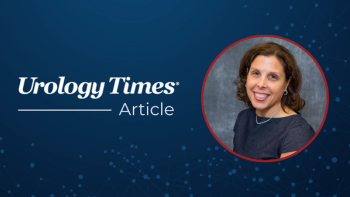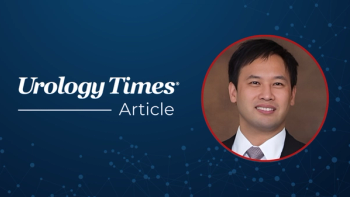
- Vol 47 No 9
- Volume 47
- Issue 9
Urologist elected to AMA Board of Trustees
Willie Underwood, III, MD, MSc, MPH, the Buffalo, NY urologist elected to the American Medical Association’s Board of Trustees in June, believes physicians must step up and help influence governmental decisions designed to improve and expand health care for all Americans.
Willie Underwood, III, MD, MSc, MPH, the Buffalo, NY urologist elected to the American Medical Association’s Board of Trustees in June, believes physicians must step up and help influence governmental decisions designed to improve and expand health care for all Americans.
“We know our health care system is broken for our patients and for us (as physicians). Urologists have to have a place at the table. We’re all in this boat together and we must be a part of the process moving forward,” Dr. Underwood said in an interview with Urology Times.
With the current political debate raging over Democratic presidential candidate proposals for some version of Medicare for All versus strengthening the Affordable Care Act (ACA) and continuing Republican efforts to scrub the ACA, Dr. Underwood is convinced that the overall outcome must be providing universal coverage for everyone.
“As physicians, we must be part of that conversation,” he said, “because we can’t do what we do best without our patients having access to coverage.”
Medicare for All would ‘destabilize coverage’
Dr. Underwood expressed the AMA’s policy position that enacting a Medicare for All plan would be fraught with problems, reducing coverage options, eliminating patient freedom of choice, injecting partisan politics into coverage policy, threatening access to mental health and contraceptive coverage, and more.
Also by Bob Gatty:
“It would destabilize coverage for 150 million people who already have insurance coverage. Health care is 20% of our economy, and Medicare for All would destabilize that,” he said, noting that such a plan would really not be a panacea, considering that millions of Medicare patients also pay for Part D drug coverage and supplemental plans to cover the gaps left by the health care plan for the elderly.
“We need to make sure that the health system works for the rich and the poor,” he stressed. “Your economic status, what you are born into, should not limit your quality of life. Poor black people have less than 10 to 12 years of life expectancy than whites, and it looks like Hispanics will be the same. That is wrong and somewhat criminal in a society that is as wealthy as ours.”
These issues must be addressed as health care policy is developed for the future.
“You’re only as strong as your weakest link,” he said, noting that in Buffalo there are five zip codes, dominated by African-American residents, where the mortality rate from disease is 300% higher than the rest of Erie County and the state of New York.
“You have a medical school, a law school, a school of public health, a dental school. Yet there is no strategic plan to fix this,” Dr. Underwood said. “These are some of the things we have to address, and I don’t think Medicare for All will fix that. We can send people to the moon and probes to Mars. We can do whatever we want to do. So, we can fix that. I think if we do, we will be a stronger nation for it.”
Next:
There are other key issues of particular concern to Dr. Underwood, such as physician burnout, which he said increased by some 40% in 2017, with some 300 to 400 physicians committing suicide last year.
“A lot of it has to do with the way our system doesn’t work for us,” he said.
Some of that involves such practice issues as requirements for electronic medical records and increased paperwork requirements that result in 2 hours of paperwork compared to 1 hour of patient care.
“Urologists are cleaning up records at night,” he said. “We are working harder with less reimbursement. Private practices are being run out of business and urologists are being forced into either large practice groups or hospital health systems. Many who are working in health systems are finding themselves less satisfied with their positions, in contracts they didn’t really understand, and are having to move out of the area if they break away from the hospital system.”
Many smaller practices and groups are in trouble, said Dr. Underwood, because they are unable to create the infrastructure necessary, such as electronic medical records technology, “and all the things that they need to pay for performance indicators, etc., so that increases the burden, and they find themselves in the position where they have to get out of the business, sell their practice to a hospital, or join a large urology group if one is in their area.”
AMA fights proposed mergers
Dr. Underwood said efforts by the AMA that helped result in proposed mergers between Aetna and Humana and Cigna and Anthem Health failing to be finalized saved physicians upwards of $500 million a year because “they would have had a monopoly and would have imposed contracts that would have reduced reimbursement rates to providers.
Read:
“It’s all about making more money, not improving care,” he said. “That’s what these mergers are all about.”
Still in play is CVS’s acquisition last year of Aetna, which is being held up by U.S. District Court Judge Richard Leon in Washington.
The AMA and its Council on Legislation, chaired by Dr. Underwood, brought together legal and academic experts and determined that the merger would have been anticompetitive and would have had “deleterious effects on both patients and physicians.”
After the U.S. Justice Department approved the merger, the AMA filed comments to Judge Leon and then filed an amicus brief explaining why Aetna’s proposed divestiture would fail to restore competition in the prescription drug plan market to premerger levels, one of the concessions CVS/Aetna needed to make to win government approval.
Dr. Underwood said he welcomes the opportunities offered by his new position on the AMA Board of Trustees, which he feels will allow him to make a real difference for patients and physicians alike.
“I look forward to playing a role in the AMA’s push to unlock the promise of a healthier nation,” he said.
Articles in this issue
over 6 years ago
Salvage LND may help delay recurrenceover 6 years ago
DeMISTifying less-invasive solutions for BPHover 6 years ago
PSMA PET/CT beneficial for prostate cancer stagingover 6 years ago
Apalutamide efficacious in previously treated patientsover 6 years ago
Analysis further refines delivery of new therapies for mCRPCover 6 years ago
What’s your biggest frustration with prior authorization?over 6 years ago
How to improve patients’ access to their health informationover 6 years ago
Antiandrogens may increase mortality risk in men with CVDNewsletter
Stay current with the latest urology news and practice-changing insights — sign up now for the essential updates every urologist needs.






